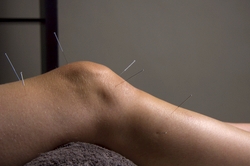Introduction

Acupuncture is more helpful than medication, exercise, physiotherapy or advice, and its effects persist over time.
This was the conclusion of a high-quality systematic review of nearly 21000 patients, which included osteoarthritis of the knee among the conditions it surveyed. Another large review funded by the National Institute for Health & Care Research, showed that acupuncture is better than standard care for osteoarthritis knee pain, and outperforms exercise and weight loss interventions. Acupuncture has been recommended for osteoarthritis of the knee in guidelines in Germany, Scotland and America (1-3).
Osteoarthritis
Beginning with osteoarthritis, you might already have had a diagnosis from your GP, or an X-ray of the affected joint. I find osteoarthritis is usually responsive to acupuncture. Because it is a degenerative condition, the sooner you start treatment, the better the results tend to be. Acupuncture is unable to reverse significant joint damage which has already occurred.
Realistic objectives are to reduce pain, reduce your intake of painkillers and anti-inflammatories, and to slow further deterioration of the joint. Knees, hips and fingers present for treatment most commonly.
Rheumatoid arthritis
Moving to rheumatoid arthritis, patients I see are usually under the regular care of either their rheumatologist or GP. Acupuncture can work effectively alongside any medication which has been prescribed. Because a systemic disease process is at work here, there is a greater need to treat the underlying imbalances which Chinese medicine is capable of identifying, as well as attending to the most painful joints.
Other Joint Problems
Finally, we have general stiffness problems, conditions like reactive arthritis, and those rheumatic aches which might have defied clear diagnosis. Sometimes, the symptoms are focal at the site of an old injury. Other times, they are more widespread, and so we bear in mind possibilities such as the pains being peri-menopausal, induced as side-effects of medication, or arising from other diseases. I need to fully examine the surrounding area and find out about your lifestyle. I will ask you about the influence of the weather on your joints. If it is a factor, patients are most likely to report damp, cold or sudden weather changes affect them.
Self-Help Measures for Arthritis
Diet and lifestyle can be crucial when helping joint problems, and I will often give you some self-help measures to implement. These will usually be simple but effective. We might for example discuss a tilt towards the Mediterranean diet as a means of combating inflammation. Your gut microbiome is also often worth looking at. Taking up cycling as exercise offers many benefits, including strengthening muscles to better support the knees, increasing synovial fluid production to lessen pain, and controlling weight to reduce joint stress. Cycling UK has an excellent article on this.
Below you can read the results of some of the research which has been undertaken into acupuncture for joint problems. The trials vary in quality, but systematic reviews and randomised controlled trials are generally considered to provide the highest quality evidence. If you would like to read more about evidence quality, I would refer you to the British Acupuncture Council’s description of the evidence pyramid.
(1) GBA. Zusammenfassender Bericht des Unterausschusses “Ärztliche Behandlung” des Gemeinsamen Bundesausschusses über die Bewertung gemäߧ135 Abs.1 SGB V der Körperakupunktur mit Nadeln ohne elektrische Stimulation bei chronischen Kopfschmerzen chronischen LWS-Schmerzen chronischen Schmerzen bei Osteoarthritis: Gemeinsamer Bundesausschuss Akupunktur, 2007.
(2) SIGN. Management of chronic pain SIGN 136. A national clinical guideline: Scottish Intercollegiate Guidelines Network, 2019.
(3) Kolasinski SL, Neogi T, Hochberg MC, et al. 2019 American College of Rheumatology/Arthritis Foundation Guideline for the Management of Osteoarthritis of the Hand, Hip, and Knee. Arthritis Care & Research, 2020.
